Neill returns for his second year on From the Tramlines.
He farms alongside his uncle, Allan Chambers, on the dry, medium loam, stoney hills of Co Down, receiving between 750mm and 800mm of rain annually.
Having farmed 400ac last year, this is increasing to 600ac this year with a new long-term lease of a large farm, with all of the land in only two blocks.
There is also a broiler unit housing 75,000 chickens on the farm on contract for Moy Park. All chicken litter is spread on the tillage land, which Neill says is great fertiliser, and can help Neill to maintain good fertility in his soils.
Neill tries to keep to a rotation of winter wheat, then winter barley, a secondary crop of stubble turnips to be grazed by sheep before a break crop of maize or spring beans.
Everything is established by plough and is drilled with a one-pass. Neill got all of his winter crops planted last autumn and the vast majority of them look very well.
Based near Ardfinnan, Co Tipperary, Pa farms 800ac of owned and rented land with his wife, Linda, and mother, Leish. They also work 150ac on contract, with all land in tillage except for 10ac of grass cut for silage each year. This is to feed cattle which are bought in for the winter to finish.
Pa grows a wide range of crops, including winter oilseed rape, wheat, barley and oats, in addition to spring oats and barley. Pa makes use of premium markets through gluten-free oats and malting barley.
A plough-based establishment system is used for all crops on what is good, free-draining soil.
Pa managed to sow all of his planned winter crops into good conditions except for 35ac of oats. He’s not too worried about this as he will just plant spring oats instead. He started planting early last autumn so that crops didn’t have to be mucked in. Everything that was planted has established well.
Pa’s area received 1,302mm of precipitation in 2022 and 1,274mm in 2023.
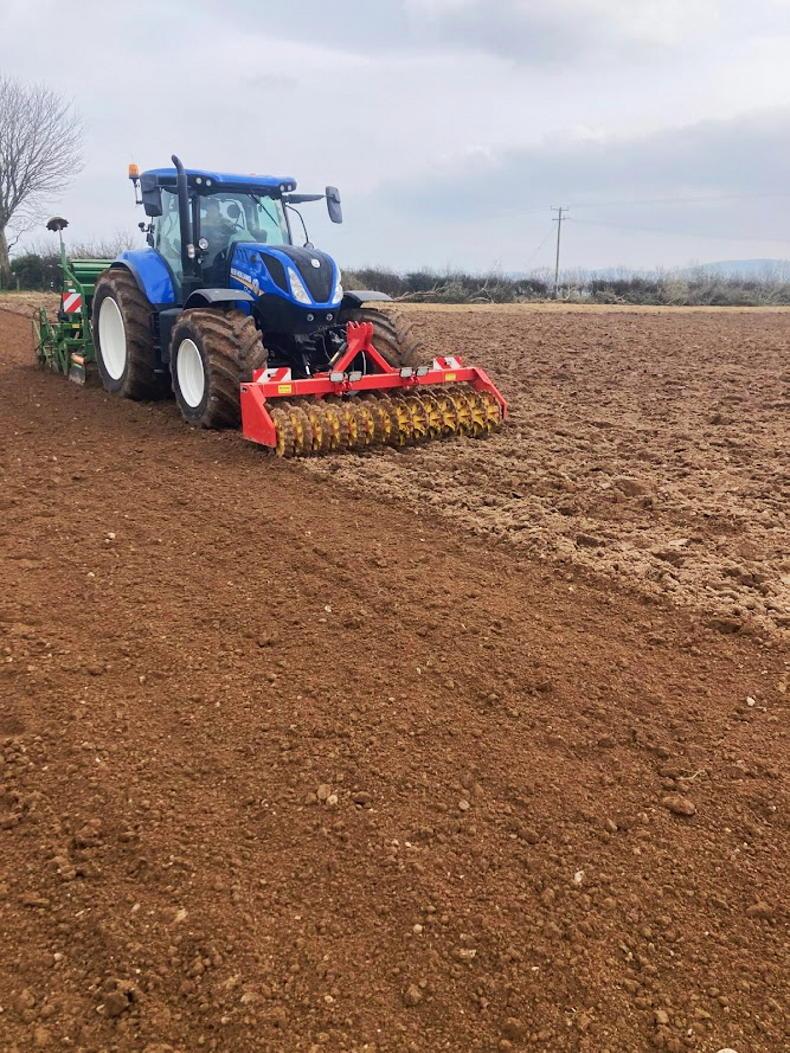
Spring oats being sown on 8 March on Pa Shine's farm in Tipperary.
Alistair is another to join us for a second year.
Alistair and his family run Carsehall Farm near Limavady, Co Derry. The farm is on land that was reclaimed about 150 years ago, with silty, loam soil.
Despite the proximity to the ocean, the farm receives about 860mm of rainfall each year (1,050mm last year), which is much lower than some local areas.
The farm consists of a herd of 270 dairy cows and 270ac of tillage, as well as a new share-farming exploratory arrangement on a further 55ac.
This year, Alistair has 40ac of oilseed rape, 40ac of wholecrop winter rye, 90ac each of winter wheat and barley, and 50ac of spring crops yet to be planted.
Alistair is in his second year of using min-till, and has now sold his plough, showing his satisfaction with the system.
Only 10ac of winter crops need to be replanted, but the remaining crops were starting to get yellow at the beginning of March, as no fertiliser had been applied.

Alistair Craig spraying a crop of winter oilseed rape in Derry.
Conall is returning for a second year of From the Tramlines.
He farms with his father, Joe, and is also a secondary school teacher, teaching agricultural science and biology.
They keep suckler cows and are agricultural contractors, focusing on baled silage and slurry spreading, alongside the tillage enterprise. They also contract to grow grain from start to finish.
Most of the land is on heavy clay and peat, which can make things quite difficult in a season like we have just had.
The farm has a mixture of owned and rented land. Given his area of the country, much of the crops are grown in very small fields.
The farm is fully plough-based.
Conall normally grows winter barley, winter oats, spring barley, spring oats and spring beans.
All of these are for animal feed.
Conall planted 70% of what he had intended last autumn, and the winter crops now look quite good.
He estimates to have lost 5% of his winter oats and 2% of his winter barley.
John Joe is the farm manager at Leo Dunne Ltd in Co Laois.
They produce conventional carrots in addition to many organic vegetables, including carrots, potatoes, leeks and kale, with over 500ac in total.
These vegetables are packed in-house before being distributed to supermarkets around the country.
Organic oats are also being grown for Flahavan’s, and they began to grow organic beans last year.
The farm has produced organic vegetables for many years. Seven people work on the farm while there are twenty people in the packhouse.
The farm is based on the banks of the river Nore, with light soils dominating on the farm.
While mostly plough-based, some fields are min-tilled if the soil is in good condition after the vegetable harvest, with a subsoiler used before planting.
Needless to say, this was very rare last autumn and very few crops were planted at all due to the poor weather and soil conditions.
The farm receives an average of 860mm of precipitation every year.
Alex is back for a second year of From the Tramlines. He farms 850ac with his father Ken in Co Westmeath in addition to agri-contracting. Over 200ac of this is in organics, growing crops such as oats for Flahavan’s.
The farm has a wide range of crops, including winter oilseed rape, winter cereals, spring cereals, spring beans, maize and spring oilseed rape. The spring oilseed rape is a seed crop grown on contract for Seedtech.
Ploughing is the main establishment system, with some small bits of min-till.
Much of the farm is on heavy clay soils, leading to an emphasis on preventing compaction.
With only 50% of what was planned to be sown last autumn in the ground, Alex has a busy spring ahead of him.
He will increase the area of spring beans over spring barley due to the economics of both crops. However, what is planted looks very well.
Alex is striving to be 100% self-sufficient in his own seed this year given the current high costs of certified seed.
Sam Myles from Co Donegal is the manager at Kepak’s farm in Clonee, Co Meath.
The farm is over 300ha in size and slurry from the beef finishing operation is a big help in improving soil phosphorus and potassium levels, improving soil health and reducing artificial fertiliser use.
Slurry is applied in the spring time on the farm to try and make the most out of it while crops are growing or being planted. An umbilical spreading system makes spreading on growing winter crops easier.
Winter wheat, winter barley, maize, oilseed rape and beans are the main crops on the farm.
Bad weather this autumn meant there was no winter barley planted, but 40ha of oilseed rape and 60ha of winter wheat were planted. The farm is on heavy ground, but is very fertile land. This year, spring barley and maize will be the main crops, along with oilseed rape and beans.
The farm is taking part in the Teagasc Signpost Programme and started to grow cover crops in 2021 to improve nitrogen use efficiency.
Since joining the programme, protecting water quality has become a key focus as the clay soils are subject to phosphorus loss.
Tom Murray, an Offaly native, is the agronomist at O’Shea Farms in Co Kilkenny.
There are about 1,200ac in the farm, with a wide range of crops grown, including potatoes, carrots, spring barley, spring oats, winter barley, winter oats, winter wheat and forage maize. There is also grassland to support a 400-head dairy herd.
The farm uses a plough, till, sow establishment method and is based on fertile sandy, silty, loam soils.
With the wet weather last autumn, only one-third of winter cereals were sowed.
Winter barley and oats were planted, but there were no opportunities to get winter wheat planted, especially with the tough potato and vegetable harvest. The farm normally receives between 1,100mm and 1,200mm of precipitation annually.
Tom is also a Nuffield scholar for 2023. This programme involves international travel to study topics to advance agricultural knowledge and development. Tom’s research topic is looking at the future of potato and vegetable production in Ireland.
Pádraig farms in Villierstown and the surrounding areas in Co Waterford.
This year, he managed to get winter barley and winter wheat planted in the autumn, but wet weather now means his oats crop will have to be planted in the springtime, along with spring barley and spring beans.
Premium crops on the farm include malting barley and seed. Pádraig is focused on improving his farm’s sustainability by improving soil health and reducing artificial fertiliser use.
He imports pig slurry and has cattle slurry from his own farm. He also plants cover crops and they are grazed over the winter by sheep.
Pádraig takes part in the Irish Farmers Journal Footprint Farmers Programme where he tests soil, slurry and silage regularly, as well as trying to improve habitats and biodiversity on the farm.
He is a meticulous recordkeeper, a key part in ensuring the farm runs as successfully as possible.
Tony is another farmer to make a second appearance on From the Tramlines. He farms over 300ac of owned and leased land in north Dublin.
Tony uses a strip-till system on his clay loam soils and places a high level of importance on soil health.
This year, he will predominantly grow maize and beans. He is trying to avoid cereals due to surplus maize on the world markets. He planted 40ac of winter wheat last autumn but it will have to be resown as it is very patchy.
Tony has taken soil samples recently and is currently figuring out his fertiliser requirements and allowances under the new fertiliser regulations, which are now more complicated as he takes in a lot of mushroom compost. He has not bought any seed or fertiliser yet as he is seeing how the weather plays out before committing to sowing certain crops.
Tony’s farm receives about 700mm of rain every year.
Barty O’Connor farms along the banks of the River Slaney in Co Wexford. Some of his ground is very sandy, but along the river can be very wet and is prone to flooding. This year, he will grow all malting barley on the farm, both winter and spring crops.
The Craft winter malt received its compound fertiliser and is looking well. It was planted on sandier ground as spring crops would not be as far on and can suffer from drought during the summer on this land.
Spring barley will be planted as soon as the weather allows. Barty managed to plough all of his spring cropping area. He had cover crops growing over winter for ACRES.
He also plants winter bird food under the scheme.
He would normally plant oats as a third crop, but is happy to plant just two crops on the farm this year now that the three-crop rule has been lifted for 2024.
Barty commented that malting barley offers him the best return and it is important to be able to plant the crop that will make the most money.
The three-crop rule would not have allowed for this..
Neill returns for his second year on From the Tramlines.
He farms alongside his uncle, Allan Chambers, on the dry, medium loam, stoney hills of Co Down, receiving between 750mm and 800mm of rain annually.
Having farmed 400ac last year, this is increasing to 600ac this year with a new long-term lease of a large farm, with all of the land in only two blocks.
There is also a broiler unit housing 75,000 chickens on the farm on contract for Moy Park. All chicken litter is spread on the tillage land, which Neill says is great fertiliser, and can help Neill to maintain good fertility in his soils.
Neill tries to keep to a rotation of winter wheat, then winter barley, a secondary crop of stubble turnips to be grazed by sheep before a break crop of maize or spring beans.
Everything is established by plough and is drilled with a one-pass. Neill got all of his winter crops planted last autumn and the vast majority of them look very well.
Based near Ardfinnan, Co Tipperary, Pa farms 800ac of owned and rented land with his wife, Linda, and mother, Leish. They also work 150ac on contract, with all land in tillage except for 10ac of grass cut for silage each year. This is to feed cattle which are bought in for the winter to finish.
Pa grows a wide range of crops, including winter oilseed rape, wheat, barley and oats, in addition to spring oats and barley. Pa makes use of premium markets through gluten-free oats and malting barley.
A plough-based establishment system is used for all crops on what is good, free-draining soil.
Pa managed to sow all of his planned winter crops into good conditions except for 35ac of oats. He’s not too worried about this as he will just plant spring oats instead. He started planting early last autumn so that crops didn’t have to be mucked in. Everything that was planted has established well.
Pa’s area received 1,302mm of precipitation in 2022 and 1,274mm in 2023.

Spring oats being sown on 8 March on Pa Shine's farm in Tipperary.
Alistair is another to join us for a second year.
Alistair and his family run Carsehall Farm near Limavady, Co Derry. The farm is on land that was reclaimed about 150 years ago, with silty, loam soil.
Despite the proximity to the ocean, the farm receives about 860mm of rainfall each year (1,050mm last year), which is much lower than some local areas.
The farm consists of a herd of 270 dairy cows and 270ac of tillage, as well as a new share-farming exploratory arrangement on a further 55ac.
This year, Alistair has 40ac of oilseed rape, 40ac of wholecrop winter rye, 90ac each of winter wheat and barley, and 50ac of spring crops yet to be planted.
Alistair is in his second year of using min-till, and has now sold his plough, showing his satisfaction with the system.
Only 10ac of winter crops need to be replanted, but the remaining crops were starting to get yellow at the beginning of March, as no fertiliser had been applied.

Alistair Craig spraying a crop of winter oilseed rape in Derry.
Conall is returning for a second year of From the Tramlines.
He farms with his father, Joe, and is also a secondary school teacher, teaching agricultural science and biology.
They keep suckler cows and are agricultural contractors, focusing on baled silage and slurry spreading, alongside the tillage enterprise. They also contract to grow grain from start to finish.
Most of the land is on heavy clay and peat, which can make things quite difficult in a season like we have just had.
The farm has a mixture of owned and rented land. Given his area of the country, much of the crops are grown in very small fields.
The farm is fully plough-based.
Conall normally grows winter barley, winter oats, spring barley, spring oats and spring beans.
All of these are for animal feed.
Conall planted 70% of what he had intended last autumn, and the winter crops now look quite good.
He estimates to have lost 5% of his winter oats and 2% of his winter barley.
John Joe is the farm manager at Leo Dunne Ltd in Co Laois.
They produce conventional carrots in addition to many organic vegetables, including carrots, potatoes, leeks and kale, with over 500ac in total.
These vegetables are packed in-house before being distributed to supermarkets around the country.
Organic oats are also being grown for Flahavan’s, and they began to grow organic beans last year.
The farm has produced organic vegetables for many years. Seven people work on the farm while there are twenty people in the packhouse.
The farm is based on the banks of the river Nore, with light soils dominating on the farm.
While mostly plough-based, some fields are min-tilled if the soil is in good condition after the vegetable harvest, with a subsoiler used before planting.
Needless to say, this was very rare last autumn and very few crops were planted at all due to the poor weather and soil conditions.
The farm receives an average of 860mm of precipitation every year.
Alex is back for a second year of From the Tramlines. He farms 850ac with his father Ken in Co Westmeath in addition to agri-contracting. Over 200ac of this is in organics, growing crops such as oats for Flahavan’s.
The farm has a wide range of crops, including winter oilseed rape, winter cereals, spring cereals, spring beans, maize and spring oilseed rape. The spring oilseed rape is a seed crop grown on contract for Seedtech.
Ploughing is the main establishment system, with some small bits of min-till.
Much of the farm is on heavy clay soils, leading to an emphasis on preventing compaction.
With only 50% of what was planned to be sown last autumn in the ground, Alex has a busy spring ahead of him.
He will increase the area of spring beans over spring barley due to the economics of both crops. However, what is planted looks very well.
Alex is striving to be 100% self-sufficient in his own seed this year given the current high costs of certified seed.
Sam Myles from Co Donegal is the manager at Kepak’s farm in Clonee, Co Meath.
The farm is over 300ha in size and slurry from the beef finishing operation is a big help in improving soil phosphorus and potassium levels, improving soil health and reducing artificial fertiliser use.
Slurry is applied in the spring time on the farm to try and make the most out of it while crops are growing or being planted. An umbilical spreading system makes spreading on growing winter crops easier.
Winter wheat, winter barley, maize, oilseed rape and beans are the main crops on the farm.
Bad weather this autumn meant there was no winter barley planted, but 40ha of oilseed rape and 60ha of winter wheat were planted. The farm is on heavy ground, but is very fertile land. This year, spring barley and maize will be the main crops, along with oilseed rape and beans.
The farm is taking part in the Teagasc Signpost Programme and started to grow cover crops in 2021 to improve nitrogen use efficiency.
Since joining the programme, protecting water quality has become a key focus as the clay soils are subject to phosphorus loss.
Tom Murray, an Offaly native, is the agronomist at O’Shea Farms in Co Kilkenny.
There are about 1,200ac in the farm, with a wide range of crops grown, including potatoes, carrots, spring barley, spring oats, winter barley, winter oats, winter wheat and forage maize. There is also grassland to support a 400-head dairy herd.
The farm uses a plough, till, sow establishment method and is based on fertile sandy, silty, loam soils.
With the wet weather last autumn, only one-third of winter cereals were sowed.
Winter barley and oats were planted, but there were no opportunities to get winter wheat planted, especially with the tough potato and vegetable harvest. The farm normally receives between 1,100mm and 1,200mm of precipitation annually.
Tom is also a Nuffield scholar for 2023. This programme involves international travel to study topics to advance agricultural knowledge and development. Tom’s research topic is looking at the future of potato and vegetable production in Ireland.
Pádraig farms in Villierstown and the surrounding areas in Co Waterford.
This year, he managed to get winter barley and winter wheat planted in the autumn, but wet weather now means his oats crop will have to be planted in the springtime, along with spring barley and spring beans.
Premium crops on the farm include malting barley and seed. Pádraig is focused on improving his farm’s sustainability by improving soil health and reducing artificial fertiliser use.
He imports pig slurry and has cattle slurry from his own farm. He also plants cover crops and they are grazed over the winter by sheep.
Pádraig takes part in the Irish Farmers Journal Footprint Farmers Programme where he tests soil, slurry and silage regularly, as well as trying to improve habitats and biodiversity on the farm.
He is a meticulous recordkeeper, a key part in ensuring the farm runs as successfully as possible.
Tony is another farmer to make a second appearance on From the Tramlines. He farms over 300ac of owned and leased land in north Dublin.
Tony uses a strip-till system on his clay loam soils and places a high level of importance on soil health.
This year, he will predominantly grow maize and beans. He is trying to avoid cereals due to surplus maize on the world markets. He planted 40ac of winter wheat last autumn but it will have to be resown as it is very patchy.
Tony has taken soil samples recently and is currently figuring out his fertiliser requirements and allowances under the new fertiliser regulations, which are now more complicated as he takes in a lot of mushroom compost. He has not bought any seed or fertiliser yet as he is seeing how the weather plays out before committing to sowing certain crops.
Tony’s farm receives about 700mm of rain every year.
Barty O’Connor farms along the banks of the River Slaney in Co Wexford. Some of his ground is very sandy, but along the river can be very wet and is prone to flooding. This year, he will grow all malting barley on the farm, both winter and spring crops.
The Craft winter malt received its compound fertiliser and is looking well. It was planted on sandier ground as spring crops would not be as far on and can suffer from drought during the summer on this land.
Spring barley will be planted as soon as the weather allows. Barty managed to plough all of his spring cropping area. He had cover crops growing over winter for ACRES.
He also plants winter bird food under the scheme.
He would normally plant oats as a third crop, but is happy to plant just two crops on the farm this year now that the three-crop rule has been lifted for 2024.
Barty commented that malting barley offers him the best return and it is important to be able to plant the crop that will make the most money.
The three-crop rule would not have allowed for this..






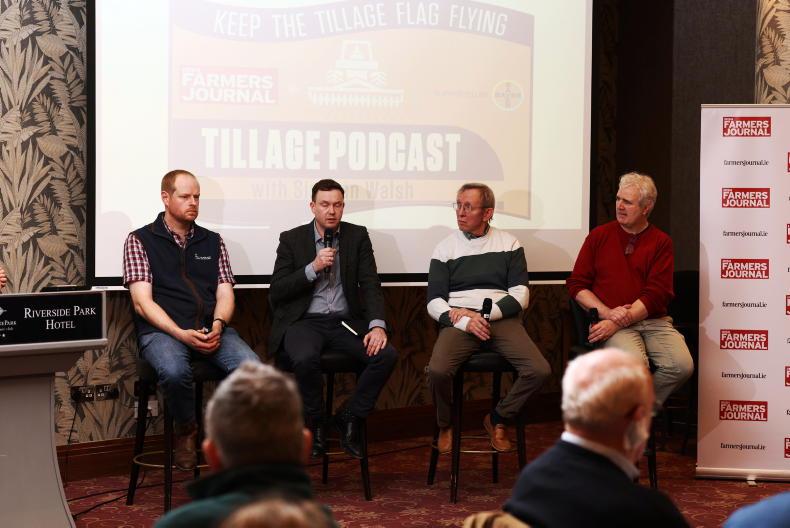

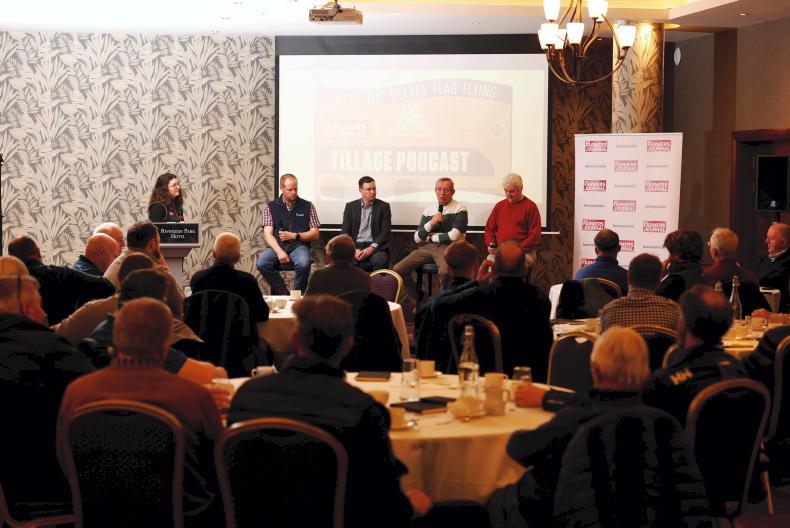
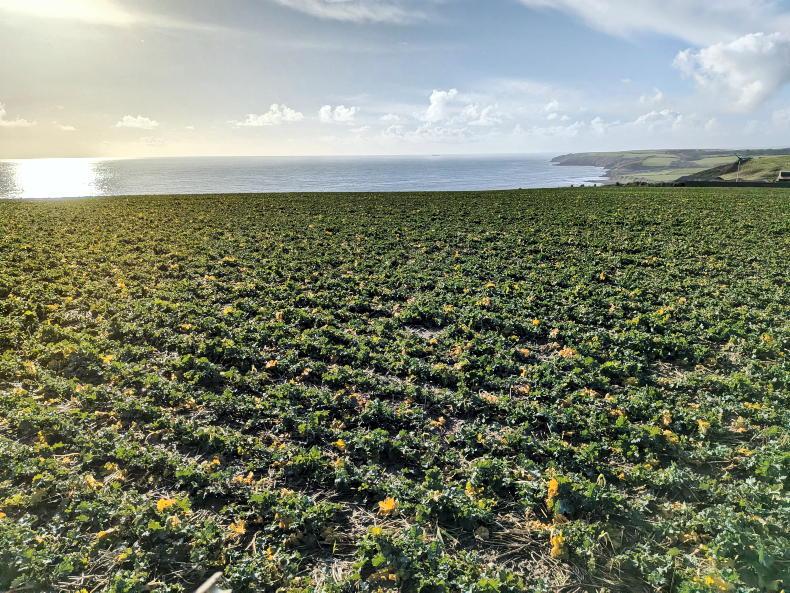
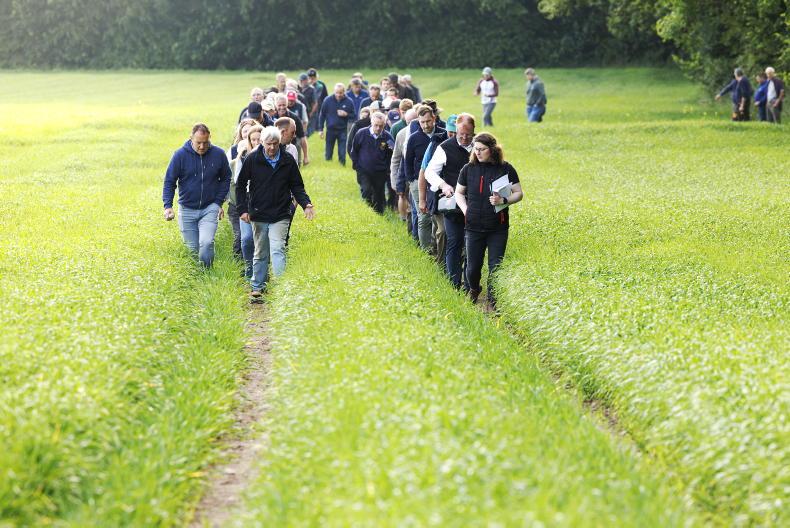
SHARING OPTIONS